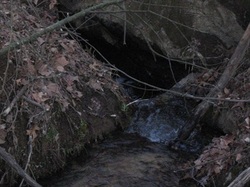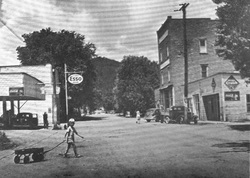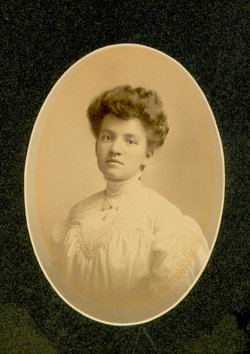The Carolinian's Archives Mists & Moonlight page is most fortunate to have another one of Author Beth Perry's Tennessee collections of haunting, superstitions and legends, etc.
Beth is an outstanding author, screenplay writer and will begin working on a new novel shortly. I consider this contribution on Tennessee Legends a special treat.
To read more of Beth's fascinating writings search for bethperry @ HubPages or click the other mature-themed site below.
Beth is an outstanding author, screenplay writer and will begin working on a new novel shortly. I consider this contribution on Tennessee Legends a special treat.
To read more of Beth's fascinating writings search for bethperry @ HubPages or click the other mature-themed site below.

TENNESSEE LEGENDS THOUGHTS BY BETH
A commonly shared belief among open-minded skeptics is that
legends originate in some grain of truth. Tennessee is rich in legends, some of them amusing, and other tragic or frightening. The following legends are compiled from East Tennessee. I do not vouch for how much truth lies behind any of them, but like all good legends, I believe that beneath the entertainment factor, some bit or more of truth dwells. And since Halloween/Samhain is not far away, I thought these might make for some timely reading.
A commonly shared belief among open-minded skeptics is that
legends originate in some grain of truth. Tennessee is rich in legends, some of them amusing, and other tragic or frightening. The following legends are compiled from East Tennessee. I do not vouch for how much truth lies behind any of them, but like all good legends, I believe that beneath the entertainment factor, some bit or more of truth dwells. And since Halloween/Samhain is not far away, I thought these might make for some timely reading.
The Singing Trees of Ripshin Mountain
According to old-timers of the area, the trees of Ripshin Mountain have been known to sing. This alleged singing occurs usually right before a local child is born or at the hour of death of someone living here. Although called "singing ", those who have heard the sound describe it more of a dulcet murmur that strums the leaves and boughs, and yet one distinctive (and unworldly) enough to make the listener's hair stand up.
Haytop Henry
The nickname Haytop Henry was bestowed on him in tribute to the way he had been found: asleep in the hay loft at the Lacey farm near what is known today as the Indian Springs community. The year was 1880, and no one in the area remembered ever having laid eyes on this child before that morning. But those that were graced to meet him would never forget him.
The farmer and his wife encouraged the boy to tell them where he came from, but an answer would have to wait as his capacity for speech was entirely undeveloped. All they could tell was he appeared to be around eight years old, with shining gold curls and deep blue eyes. He was also clean and very well dressed. There was a knapsack found in the hay he had slept on, in which had been placed a meal of pork shank, biscuits, and a piece of red velvet cake. Overall the boy appeared to be the picture of health, except for his left temple, which was noticeably elevated and covered over by scar tissue. Those who saw him surmised someone had burned the child at a tender age. Oddly, he did not seem afraid of the elderly farmer, his wife or any of their farm hands.
Mr. and Mrs. Lacey took the boy into their home. After several weeks waiting for the boy's family to come claim him, it was decided he had been abandoned. The old couple had already raised several of their own children, but they had come to love this stray child, so adopted him and gave him the name Henry. With their patient help, Henry learned to speak coherently. He also learned to read and write, and took especial delight in drawing pictures.
Although Henry was said to be quiet around most everyone except his parents, in his early adolescence he began to exhibit a gift for prediction. He knew when the foals and calves were about to drop, and accurately predicted their gender and markings. He was able to tell his mother when she needed to set out extra plates for unexpected dinner guests. He reliably warned his father of hail before it arrived. He knew where to locate lost piglets and escaped cattle. He knew the day the first snow of winter would fall and what subject the minister would preach about come Sunday morning. One day, during perfectly mild weather, he urgently told one of the hired hands to move away from the tree the man had taken shade under. The hired hand complied none too soon, for moments later lightning struck the tree and cleaved it in half.
According to old-timers of the area, the trees of Ripshin Mountain have been known to sing. This alleged singing occurs usually right before a local child is born or at the hour of death of someone living here. Although called "singing ", those who have heard the sound describe it more of a dulcet murmur that strums the leaves and boughs, and yet one distinctive (and unworldly) enough to make the listener's hair stand up.
Haytop Henry
The nickname Haytop Henry was bestowed on him in tribute to the way he had been found: asleep in the hay loft at the Lacey farm near what is known today as the Indian Springs community. The year was 1880, and no one in the area remembered ever having laid eyes on this child before that morning. But those that were graced to meet him would never forget him.
The farmer and his wife encouraged the boy to tell them where he came from, but an answer would have to wait as his capacity for speech was entirely undeveloped. All they could tell was he appeared to be around eight years old, with shining gold curls and deep blue eyes. He was also clean and very well dressed. There was a knapsack found in the hay he had slept on, in which had been placed a meal of pork shank, biscuits, and a piece of red velvet cake. Overall the boy appeared to be the picture of health, except for his left temple, which was noticeably elevated and covered over by scar tissue. Those who saw him surmised someone had burned the child at a tender age. Oddly, he did not seem afraid of the elderly farmer, his wife or any of their farm hands.
Mr. and Mrs. Lacey took the boy into their home. After several weeks waiting for the boy's family to come claim him, it was decided he had been abandoned. The old couple had already raised several of their own children, but they had come to love this stray child, so adopted him and gave him the name Henry. With their patient help, Henry learned to speak coherently. He also learned to read and write, and took especial delight in drawing pictures.
Although Henry was said to be quiet around most everyone except his parents, in his early adolescence he began to exhibit a gift for prediction. He knew when the foals and calves were about to drop, and accurately predicted their gender and markings. He was able to tell his mother when she needed to set out extra plates for unexpected dinner guests. He reliably warned his father of hail before it arrived. He knew where to locate lost piglets and escaped cattle. He knew the day the first snow of winter would fall and what subject the minister would preach about come Sunday morning. One day, during perfectly mild weather, he urgently told one of the hired hands to move away from the tree the man had taken shade under. The hired hand complied none too soon, for moments later lightning struck the tree and cleaved it in half.

His mother once asked Henry if he could "see" everything that lay ahead. Henry's answer was straightforward but cryptic, "All I am supposed to see, Mother, and many things I don't want to see. But about the nature of my own death, the eyes are thankfully blind."
In his young adulthood Henry's reputation as a natural born soothsayer drew its share of undesired attention. Some folks would chase him down just to ask for petty, gossipy information. The small-minded among the church congregation believed Henry was evil and they broke away from the church when the minister defended him. More often than not, however, people respected Henry's abilities and in fact, considered him a local godsend.
One day young Marilee Phelps and a friend were planning a picnic lunch in a meadow. They had told no one but their parents about it. As Marilee was baking a pie to take, a frantic knock was heard at the front door. Mrs. Phelps hardly got a word in as she opened the door to Henry Lacey. Although he had never been in their home before, he made his way to the kitchen where Marilee was. Here, he told Marilee to stay away from the meadow because something "wrong" would happen. Luckily for Marilee, she took his advice, as did her girl friend. In the morning the owner of the meadow told the Phelps family he had shot a mad boar the previous evening. The boar had been found roaming the very spot that his daughter and Marilee had chosen for their picnic.
Henry and Marilee became close after this, and planned to marry the next summer. But one afternoon of the coming spring Henry's father and one of the hired hands found Henry prostrate by the side of the road. Henry's face was ashen and he had lost the ability to speak or walk. He was immediately brought home. Marilee was summoned, but Henry took his last breath before she could get there.
If Henry ever told his adopted family about his birth family or divulged who had brought him to their farm, the Laceys kept the information to themselves. They buried Henry in their family cemetery, along with the second face and eyeballs the inquisitive undertaker had discovered beneath the scar on the young man's temple.
In his young adulthood Henry's reputation as a natural born soothsayer drew its share of undesired attention. Some folks would chase him down just to ask for petty, gossipy information. The small-minded among the church congregation believed Henry was evil and they broke away from the church when the minister defended him. More often than not, however, people respected Henry's abilities and in fact, considered him a local godsend.
One day young Marilee Phelps and a friend were planning a picnic lunch in a meadow. They had told no one but their parents about it. As Marilee was baking a pie to take, a frantic knock was heard at the front door. Mrs. Phelps hardly got a word in as she opened the door to Henry Lacey. Although he had never been in their home before, he made his way to the kitchen where Marilee was. Here, he told Marilee to stay away from the meadow because something "wrong" would happen. Luckily for Marilee, she took his advice, as did her girl friend. In the morning the owner of the meadow told the Phelps family he had shot a mad boar the previous evening. The boar had been found roaming the very spot that his daughter and Marilee had chosen for their picnic.
Henry and Marilee became close after this, and planned to marry the next summer. But one afternoon of the coming spring Henry's father and one of the hired hands found Henry prostrate by the side of the road. Henry's face was ashen and he had lost the ability to speak or walk. He was immediately brought home. Marilee was summoned, but Henry took his last breath before she could get there.
If Henry ever told his adopted family about his birth family or divulged who had brought him to their farm, the Laceys kept the information to themselves. They buried Henry in their family cemetery, along with the second face and eyeballs the inquisitive undertaker had discovered beneath the scar on the young man's temple.
Big Dane
The rivers of Tennessee are famous for having some of the biggest catfish in the world. Divers and fishermen alike have reported seeing ones large enough to swallow a full-grown man whole.
According to local legend, Big Dane of Holston River was the biggest of them all. Not only was he known for his size, but his un-fish-like and charitable nature. Old-timers used to say Big Dane once saved a drowning old man by buoying him up from below and pushing him back to shallow water. The great fish was said to have similarly saved a newly wed couple, who had rented an aged fishing boat without first inspecting it for rot.
Why he was called Big Dane is a mystery; some believed he was first reeled in by the Danish-born father of a small boy, a child that took pity on the fish because it had a "blind eye", and who told his father the fish deserved to be released for putting up a worthy fight. Others have said Big Dane got his name for being even larger than Great Danes. However he got his name, sightings of Big Dane have dwindled over time. Perhaps he simply died at a ripe old age? Whatever may have happened to Big Dane, the rare contemporary report of human encounters with the leviathan still makes for a good whopper "fish tale".
The rivers of Tennessee are famous for having some of the biggest catfish in the world. Divers and fishermen alike have reported seeing ones large enough to swallow a full-grown man whole.
According to local legend, Big Dane of Holston River was the biggest of them all. Not only was he known for his size, but his un-fish-like and charitable nature. Old-timers used to say Big Dane once saved a drowning old man by buoying him up from below and pushing him back to shallow water. The great fish was said to have similarly saved a newly wed couple, who had rented an aged fishing boat without first inspecting it for rot.
Why he was called Big Dane is a mystery; some believed he was first reeled in by the Danish-born father of a small boy, a child that took pity on the fish because it had a "blind eye", and who told his father the fish deserved to be released for putting up a worthy fight. Others have said Big Dane got his name for being even larger than Great Danes. However he got his name, sightings of Big Dane have dwindled over time. Perhaps he simply died at a ripe old age? Whatever may have happened to Big Dane, the rare contemporary report of human encounters with the leviathan still makes for a good whopper "fish tale".

The Sinkhole Folk
Tennessee land is pocked by a great many sinkholes. Some of these have become natural (and popular) swimming pools over time, and others, upon opening, have given entrance to large, meandering underground cave systems.
In Sullivan County, some residents have reported seeing people going down into these sinkholes. These odd folk are reported to look human, but to have bluish or green-tinted skin. The first time I ever heard of the Sinkhole Folk was from a middle-school teacher of mine (we'll call her Mrs. K.). Mrs. K. taught English class and at the time we were studying Beowulf. She mentioned one day, quite casually, that she never knew what to make of the story of Grendel and his mother, but that she didn't doubt there were strange things in this world even the most educated of men could not explain. One of my fellow students asked her why she believed this and she told the class this little story:
As a young woman she and her husband had been out walking near their property when they came across a young boy standing near an old fallen log. He looked sad and lost. Mrs. K and her husband approached to offer him help, when they saw the boy had bluish skin, and his eyes were almost white. On seeing them, the boy began to cry and back away. The next moment a naked woman, with the same blue skin and white eyes,came running out of some brush. She took the boy's hand and ran off. The K.'s followed, and saw the woman and the boy got down and crawled into the sinkhole. When the K.'s searched the sinkhole they didn't think any human being could possibly have got past the muck and debris of rock there. Mrs. K. and her husband spent the rest of the day searching for them, but the two were gone and they never saw them again.
Some years later I heard similar tales about the Sinkhole Folk. Although these tales came from different places around the Tri-Cities, all of then involved blue or green skinned people that allegedly come and go through sinkholes.
Tennessee land is pocked by a great many sinkholes. Some of these have become natural (and popular) swimming pools over time, and others, upon opening, have given entrance to large, meandering underground cave systems.
In Sullivan County, some residents have reported seeing people going down into these sinkholes. These odd folk are reported to look human, but to have bluish or green-tinted skin. The first time I ever heard of the Sinkhole Folk was from a middle-school teacher of mine (we'll call her Mrs. K.). Mrs. K. taught English class and at the time we were studying Beowulf. She mentioned one day, quite casually, that she never knew what to make of the story of Grendel and his mother, but that she didn't doubt there were strange things in this world even the most educated of men could not explain. One of my fellow students asked her why she believed this and she told the class this little story:
As a young woman she and her husband had been out walking near their property when they came across a young boy standing near an old fallen log. He looked sad and lost. Mrs. K and her husband approached to offer him help, when they saw the boy had bluish skin, and his eyes were almost white. On seeing them, the boy began to cry and back away. The next moment a naked woman, with the same blue skin and white eyes,came running out of some brush. She took the boy's hand and ran off. The K.'s followed, and saw the woman and the boy got down and crawled into the sinkhole. When the K.'s searched the sinkhole they didn't think any human being could possibly have got past the muck and debris of rock there. Mrs. K. and her husband spent the rest of the day searching for them, but the two were gone and they never saw them again.
Some years later I heard similar tales about the Sinkhole Folk. Although these tales came from different places around the Tri-Cities, all of then involved blue or green skinned people that allegedly come and go through sinkholes.

The Lost Child of Old Butler
When the TVA decided to build the Watauga Dam and create Watauga Lake, there was one major obstacle in the plan, and that was the communities and farms already established in the Roan Creek and valley regions. So it was decided to uproot these communities and their residents and move them elsewhere. Among the uprooted was the old and lively town of Butler (known today as Old Butler), which was originally established in 1778. It was a major effort, but at last the town and its residences were all resettled to higher ground. Soon the whole valley area was flooded. Today Old Butler, like the countless farms and other old locations, sleeps beneath the artificial lake.
Not so easily rested is the tale of the Lost Child. It is one shared by tourists and locals alike, and one very similar in each case: a plaintive voice heard in the wee hours of the night calling out "Mama!" or "Mama, where are you?" Some who have heard this voice say they indeed found the calling one - a little child wearing denim overalls and holding a kitten, and typically standing near the lake edge. He (or she?) might acknowledge their presence and questions with a look, but more often than not, the child simply walks away and vanishes into the mist. Still others say that they have witnessed the child wade straight into the water. These witnesses typically also report seeing the spectacular sight of Old Butler glowing like polished silver at the bottom of the lake.
When the TVA decided to build the Watauga Dam and create Watauga Lake, there was one major obstacle in the plan, and that was the communities and farms already established in the Roan Creek and valley regions. So it was decided to uproot these communities and their residents and move them elsewhere. Among the uprooted was the old and lively town of Butler (known today as Old Butler), which was originally established in 1778. It was a major effort, but at last the town and its residences were all resettled to higher ground. Soon the whole valley area was flooded. Today Old Butler, like the countless farms and other old locations, sleeps beneath the artificial lake.
Not so easily rested is the tale of the Lost Child. It is one shared by tourists and locals alike, and one very similar in each case: a plaintive voice heard in the wee hours of the night calling out "Mama!" or "Mama, where are you?" Some who have heard this voice say they indeed found the calling one - a little child wearing denim overalls and holding a kitten, and typically standing near the lake edge. He (or she?) might acknowledge their presence and questions with a look, but more often than not, the child simply walks away and vanishes into the mist. Still others say that they have witnessed the child wade straight into the water. These witnesses typically also report seeing the spectacular sight of Old Butler glowing like polished silver at the bottom of the lake.

The Wildwood Flower (Maid)
There is debate as to whether the story of the Wildwood Flower is based on a real life event in the Tennessee hills , or if it is legend inspired by archaic ballads and poems. Wherever the legends may lie, this tale-turned-legend made an indelible impression on composers and writers alike. Poet Maud Irving is credited for writing the original lyrics for, I'll Twine Mid the Ringlets, the 19th century ballad that recounts the Maid's story. These lyrics were later used in the song, Wildwood Flower, made popular by the Carter family. And a few years ago, I wrote the short story , Wildwood Maid, inspired by the lonely Maid who seeks love from legend beyond the mortal plane.
If the Wildwood Flower did indeed exist, her name has been lost to the ages. No one is even sure exactly where the events of the story conspired. They could have taken place in the lush mountains that seperate Tennessee from North Carolina, or possibly even the fertile valley hills of Cades Cove. Whenever the story took place, it is at once a tragic story of love and betrayal.
As they tell it in Appalachia:
The Maid was a young Irishwoman of fourteen or fifteen when severe hardship came upon her family. The family had been reduced to poverty and her brothers languished in prison for angering the English. The final straw for the family came with the death of the paternal head of the family. The Maid's mother, wanting to save her daughter from what seemed a curse on the family, sought a way to get the girl to America. This would not be easy and it took some time to find the contacts necessary to accomplish this.
At length the mother arranged for the daughter to take work as an indentured servant in newly penetrated territories in Tennessee. She sold all her worldly goods and bought the girl passage on a ship bound to America. The Maid did not want to leave her mother, but seeing how anxious her mother was about her future, agreed to go. After the lengthy journey across the sea and an adventurous carriage trek through the wilderness, the Maid arrived at her employers' home in the Eastern mountain ranges of Tennessee.
The Maid's employers were charitable, decent folk that treated the Maid well. Her dark eyes and beauty , however, did not go unnoticed by the oldest son. It was not long before the son declared his love for the Maid. The Maid sucumed to his seductions and declared affection. In fact, so devoted to her love act, that he informed his family that her intended to marry his Irish "flower". The family was happy in his choice, for they knew the Maid to be a caring and hard-working young woman; one they believed had finally tamed the son 's roguish ways.
But shortly after announcing their engagement, the son met a woman in his social circle that would change his life forever. The daughter of a merchant from Boston, this woman was not only beautiful, but sophisticated and fashionably exciting. Forgetting the betrothal to the Maid, the son and the object of his new infatuation sought out a minister and were wed.
His parents were hardly approving of this marriage. And when it was discovered that the Maid carried his child, they released her from her legal bonds and gave her the portion of property that would have gone to the son. They even built a cabin in the woods there for her to dwell in and raise the child. Embarrassed by losing his inheritance , the son left with his bride to distant Boston. The Maid gave birth to a son and named him after the paternal grandfather that had shown her kindness. Unfortunately, as comely as the child was, he only lived for a few days.
The Maid was a landowner in her own right now and cherished by the family of the man that had betrayed her. Many men ventured to be court the Maid and take her to wife, even his younger brother and old friends. The Maid would have none of them, however, and it was suspected that she waited for her lover to see his wife as the noxious vine that she was and he returned to the arms of the flower that still loved him.
But the Maid's grief was not over. When her lover did return, it was in a pinewood box. Once returned to her norhtern homeland, his bride had taken up with another behind his back, and this other man had challenged him to a dual. The challenged had won, and the widow, not wanting any more to do with her husband, had sent his body back to the Smokey Mountains for burial.
No one had seen the Maid for several days following the funeral. Her lover's family paid a call to her cabin, only to find her missing. They did find her valuables and clothing, all unmolested, as well as a small portrait of their son hanging on the wall of the Maid's bedroom. A thorough search of the area was carried out. But the Maid's body was not found and friends and neighbors were ever to lay eyes on her again.
Years passed and the Maid's deserted home turned to disrepair. But even as time and nature reclaimed what she had left behind, local rumors began to spread. Married men would tell companions, of how while out hunting or fishing, they had encountered a pretty dark eyed young woman in the wood. She would guied them inside a cozy inviting cabin, and here offered them drink, food and her charming company. Most of them took her up on the offer, and content they would be until they made the mistake of admitting to the girl that their troth was already given to another. And then, as the story goes, the woodland nymph with the dark eyes would suddenly vanish and the cabin would turn into the decayed ruin of it's true state. But more disturbing than these tales were the vanishings of perfectly fit young bachelors known to had ventured onto the old property. What fate these men met, could only be speculated on. But the legend of the Wildwood Flower would survive long after they, their kin and friends were dust in the ground.
There is debate as to whether the story of the Wildwood Flower is based on a real life event in the Tennessee hills , or if it is legend inspired by archaic ballads and poems. Wherever the legends may lie, this tale-turned-legend made an indelible impression on composers and writers alike. Poet Maud Irving is credited for writing the original lyrics for, I'll Twine Mid the Ringlets, the 19th century ballad that recounts the Maid's story. These lyrics were later used in the song, Wildwood Flower, made popular by the Carter family. And a few years ago, I wrote the short story , Wildwood Maid, inspired by the lonely Maid who seeks love from legend beyond the mortal plane.
If the Wildwood Flower did indeed exist, her name has been lost to the ages. No one is even sure exactly where the events of the story conspired. They could have taken place in the lush mountains that seperate Tennessee from North Carolina, or possibly even the fertile valley hills of Cades Cove. Whenever the story took place, it is at once a tragic story of love and betrayal.
As they tell it in Appalachia:
The Maid was a young Irishwoman of fourteen or fifteen when severe hardship came upon her family. The family had been reduced to poverty and her brothers languished in prison for angering the English. The final straw for the family came with the death of the paternal head of the family. The Maid's mother, wanting to save her daughter from what seemed a curse on the family, sought a way to get the girl to America. This would not be easy and it took some time to find the contacts necessary to accomplish this.
At length the mother arranged for the daughter to take work as an indentured servant in newly penetrated territories in Tennessee. She sold all her worldly goods and bought the girl passage on a ship bound to America. The Maid did not want to leave her mother, but seeing how anxious her mother was about her future, agreed to go. After the lengthy journey across the sea and an adventurous carriage trek through the wilderness, the Maid arrived at her employers' home in the Eastern mountain ranges of Tennessee.
The Maid's employers were charitable, decent folk that treated the Maid well. Her dark eyes and beauty , however, did not go unnoticed by the oldest son. It was not long before the son declared his love for the Maid. The Maid sucumed to his seductions and declared affection. In fact, so devoted to her love act, that he informed his family that her intended to marry his Irish "flower". The family was happy in his choice, for they knew the Maid to be a caring and hard-working young woman; one they believed had finally tamed the son 's roguish ways.
But shortly after announcing their engagement, the son met a woman in his social circle that would change his life forever. The daughter of a merchant from Boston, this woman was not only beautiful, but sophisticated and fashionably exciting. Forgetting the betrothal to the Maid, the son and the object of his new infatuation sought out a minister and were wed.
His parents were hardly approving of this marriage. And when it was discovered that the Maid carried his child, they released her from her legal bonds and gave her the portion of property that would have gone to the son. They even built a cabin in the woods there for her to dwell in and raise the child. Embarrassed by losing his inheritance , the son left with his bride to distant Boston. The Maid gave birth to a son and named him after the paternal grandfather that had shown her kindness. Unfortunately, as comely as the child was, he only lived for a few days.
The Maid was a landowner in her own right now and cherished by the family of the man that had betrayed her. Many men ventured to be court the Maid and take her to wife, even his younger brother and old friends. The Maid would have none of them, however, and it was suspected that she waited for her lover to see his wife as the noxious vine that she was and he returned to the arms of the flower that still loved him.
But the Maid's grief was not over. When her lover did return, it was in a pinewood box. Once returned to her norhtern homeland, his bride had taken up with another behind his back, and this other man had challenged him to a dual. The challenged had won, and the widow, not wanting any more to do with her husband, had sent his body back to the Smokey Mountains for burial.
No one had seen the Maid for several days following the funeral. Her lover's family paid a call to her cabin, only to find her missing. They did find her valuables and clothing, all unmolested, as well as a small portrait of their son hanging on the wall of the Maid's bedroom. A thorough search of the area was carried out. But the Maid's body was not found and friends and neighbors were ever to lay eyes on her again.
Years passed and the Maid's deserted home turned to disrepair. But even as time and nature reclaimed what she had left behind, local rumors began to spread. Married men would tell companions, of how while out hunting or fishing, they had encountered a pretty dark eyed young woman in the wood. She would guied them inside a cozy inviting cabin, and here offered them drink, food and her charming company. Most of them took her up on the offer, and content they would be until they made the mistake of admitting to the girl that their troth was already given to another. And then, as the story goes, the woodland nymph with the dark eyes would suddenly vanish and the cabin would turn into the decayed ruin of it's true state. But more disturbing than these tales were the vanishings of perfectly fit young bachelors known to had ventured onto the old property. What fate these men met, could only be speculated on. But the legend of the Wildwood Flower would survive long after they, their kin and friends were dust in the ground.




 RSS Feed
RSS Feed
